Let’s talk about protein: its role in our body, health benefits, and how much you should be eating for your goals. Download my free handout on protein intake recommendations!
Get Your Free Protein 101 Guide
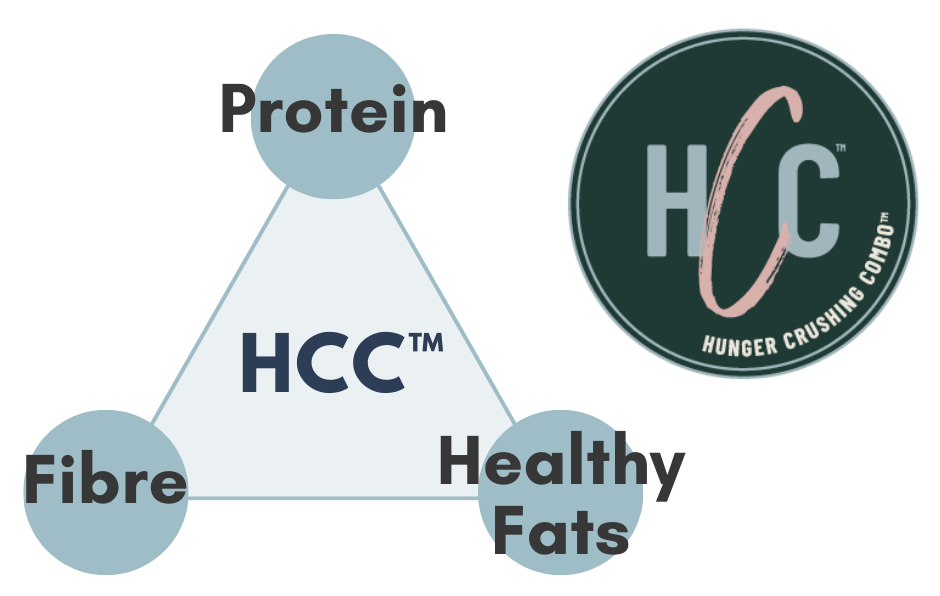
Protein is one of the three macronutrients and a key part of Abbey’s Hunger Crushing Combo™. It plays a structural role in our body, forming blood cells, skin, hair, nails, hormones, enzymes and more. Without protein, our body would not be able to maintain acid-base balance, fluid status, or build the tissues we need to survive.
In this post, we’ll be discussing in-depth about the role of protein, protein intake recommendations for weight loss and muscle growth, plant-based diets, and more.
Why Is Protein Important?
Beyond basic physiological functions, there are a couple of key reasons why we might want to prioritize protein in our diet.
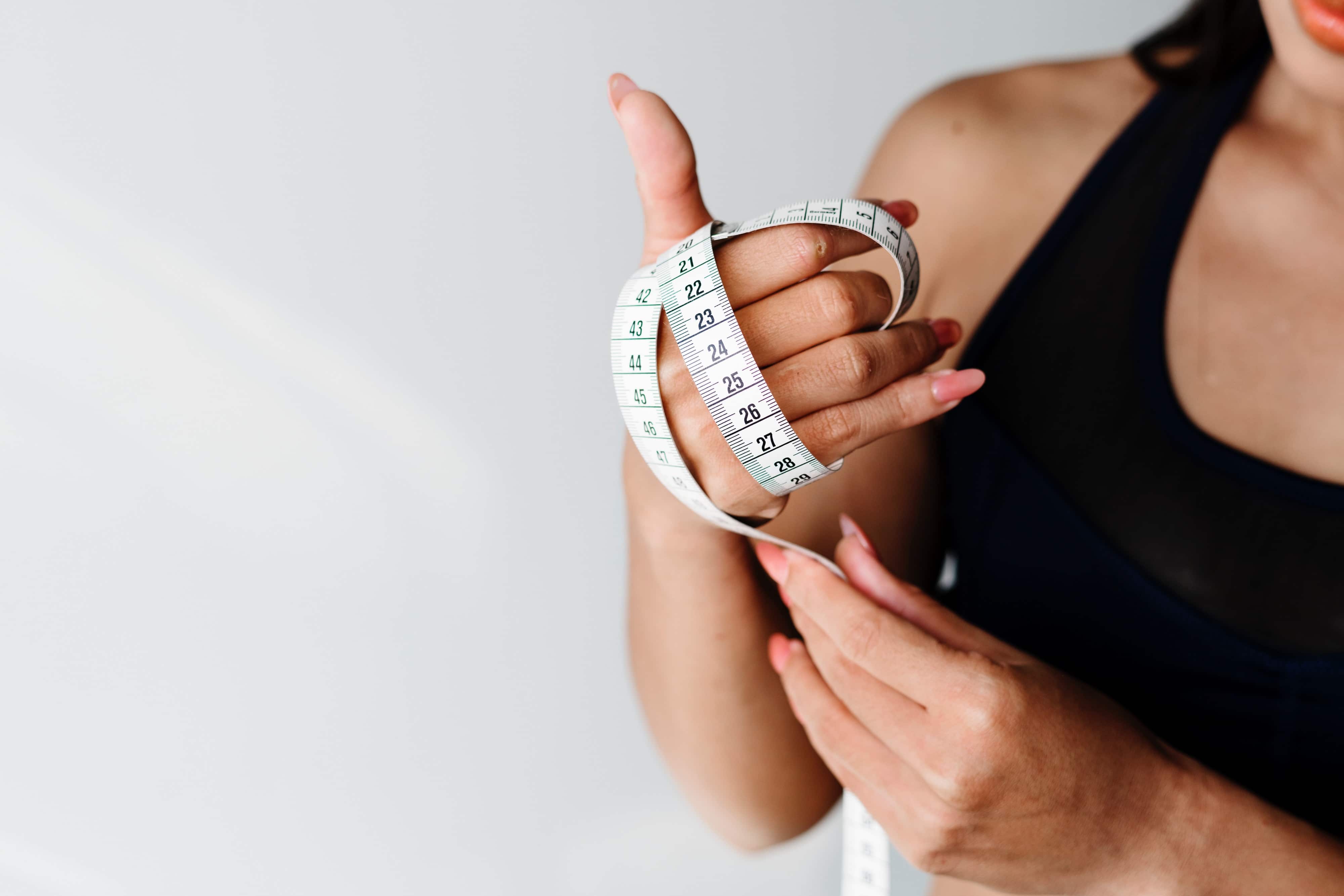
Muscle Growth
One of protein’s most well known uses is muscle protein synthesis. When we eat protein-rich foods, the protein is broken down in the body and recombined to form new proteins. Muscle protein synthesis is a process that occurs when our body is in a state of positive protein balance and begins to build muscle. In order for this to be possible, we need to be eating adequate protein and ideally, combining this with resistance training.
Weight Loss
High protein intake is also a key pillar of sustainable weight loss. There are several factors at play that may explain why:
- Protein improves satiety and decreases appetite by reducing our hunger hormone, ghrelin, and increasing our satiety hormone, peptide YY. When we replace other foods with protein, it helps us feel full without intentionally reducing our plate volume.
- Protein increases metabolism. It takes our body longer to digest protein than carbs and fat, and muscle protein synthesis is an exertive process. Additionally, protein supports the growth of muscle tissues, which are very metabolically active in the body. These different components cumulate to increase calories burned, thereby contributing to weight loss.
- Adequate protein intake prevents muscle loss when trying to lose weight. We want to minimize muscle breakdown during weight loss, so this is an important consideration.
We’ll talk about specific protein intake recommendations for weight loss later on.
Aging and Bone Health
As we age, we begin to experience shifts in body composition and a decline in muscle mass. Along with this, we see an increase in osteoporosis, falls and fractures. When consumed with adequate calcium, research shows that protein may have a supportive effect on bone health. Additionally, focusing on muscle strength and mass can help maintain mobility and strength, thereby decreasing fall risk.
Eating enough protein as we age is crucial for bone health, slowing muscle loss, and staying healthy.
Illness and Injury Recovery
When we get sick or hurt ourselves, our body enters an inflammatory state and begins breaking down proteins. Although specific disease states may require protein restrictions, our body generally has higher protein requirements during an acute illness, injury, or traumatic event. For example, we know that patients with burns or skin wounds have very high protein needs, as their bodies are rapidly breaking down protein in the acute state. In the rehabilitation phase, protein is required to support healing.
Protein Intake Recommendations
Protein intake recommendations are typically expressed as a percentage of total calories, or the grams of protein needed per kilogram of body weight. Your recommendations will vary based on age, sex, activity level and more, however there are general guidelines based on your goals.

Maintenance
Nutrition guidelines recommend that 10-35% of total calories should be from protein. Looking at body weight, the daily recommended allowance (DRI) is at least 0.8 g/kg of protein, but this is the bare minimum to prevent disease and malnutrition.
With that being said, we know how protein has additional benefits aside from basic physiological functions. Research supports at least 1.2 g/kg of protein for optimal health. This is around 15% of total calories.
Weight Loss
We discussed the role protein plays in sustainable weight loss, so it makes sense that people with this goal will have higher protein needs. In fact, research has shown that a high protein intake has a 3x greater effect on fat loss when going from 10-15% protein to a diet of 20-30% protein. Generally, the higher your energy deficit, the more protein is recommended.
For most people, a sustainable rate of weight loss is around 0.5-1.5 lbs per week, allowing for the least amount of muscle loss. This coincides with about a 20% deficit and at least 1.8 g/kg of protein, or 30% of calories from protein.
Weight Gain and Muscle Growth
Research has shown that optimal muscle growth comes with a protein intake of 1.6-2.2 g/kg, or around 20% of your total calories. It may seem counter-intuitive that there is a lower amount recommended for weight gain compared to weight loss, however that’s because carbohydrates. When aiming for weight gain, you need the energy from carbs to perform well in workouts and support muscle growth.
Sports Nutrition
For athletes, protein intake recommendations can have a wide range depending on the sport and expenditure. Let’s break it down between endurance vs non-endurance sports.
Endurance sports (think running, cycling, and swimming) that involve training for 2 hours at a high intensity have a much higher caloric need, meaning they also need a higher protein intake. One study found that endurance athletes need ~1.85 g/kg of protein per day in order to maximize protein synthesis post exercise.
As for non-endurance athletes (think baseball, volleyball, and short distance track/field), we have a wider range depending on what the athlete’s goal is. To sum it up, in order maximize muscle protein synthesis for these athletes, consuming 1.3-1.8 g/kg of protein per day is ideal.
Amino Acids
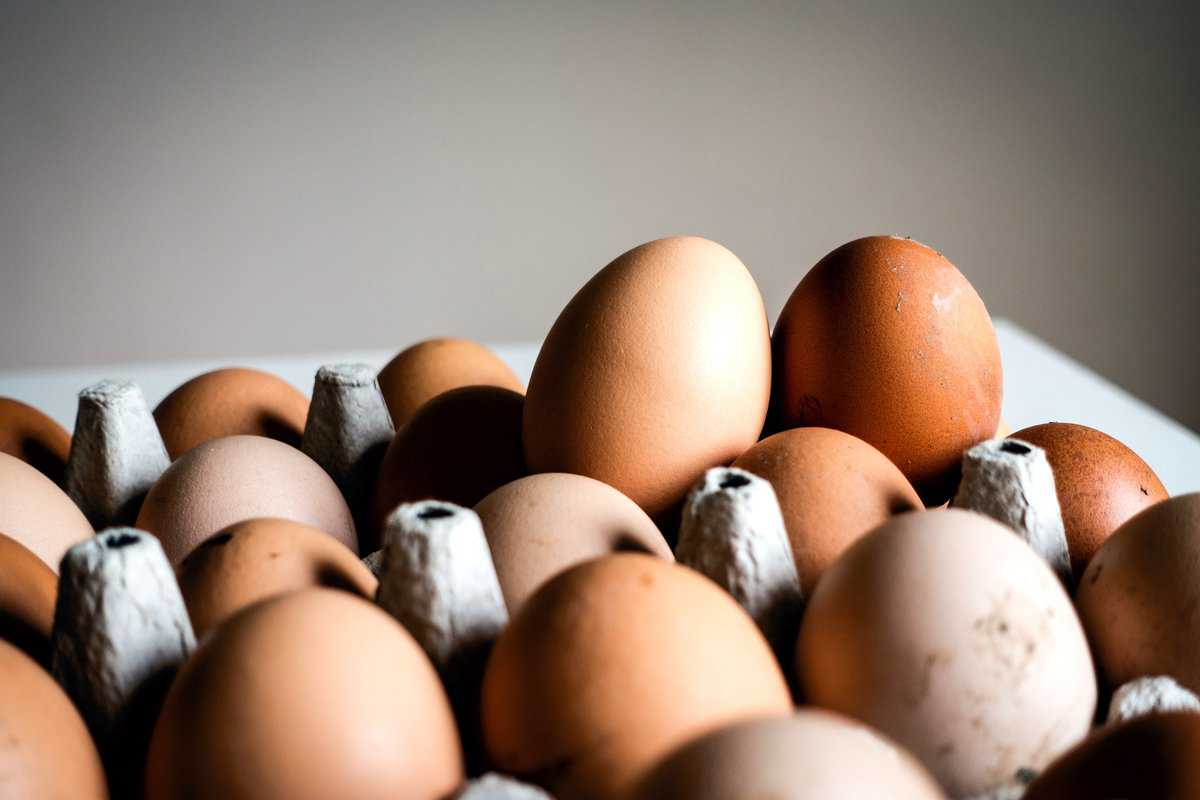
Next up, we’re talking going even deeper into specific amino acids. Amino acids are the building blocks that make up proteins. In addition to supporting growth and maintenance, they also aid in metabolic pathways, reproduction, and immunity.
Amino acids can be categorized into essential vs. non-essential amino acids. Essential amino acids cannot be made in our body, so we must consume them in our diet. A good way to remember this is “essential amino acids are ESSENTIAL to our diet!”. The essential amino acids include valine, methionine, phenylalanine, histidine, isoleucine, leucine, threonine, tryptophan, and lysine. As for the non-essential, our body can synthesize the following amino acids on its own: glutamine, glycine, alanine, arginine, cysteine, glutamic acid, serine, proline, asparagine, tyrosine, and aspartic acid
To break it down even further, we also have a group of amino acids called branched chain amino acids (BCAAs), These help build protein in muscle and may even reduce muscle breakdown. The BCAAs include leucine, isoleucine, and valine which can be found in eggs, meat products, tofu, lentils, and more.
Leucine
One up-and-coming amino acid to keep our eyes on is leucine. The evidence has shown that leucine plays a key role in stimulating muscle protein synthesis as well as preventing deterioration as we get older. Further research is still being completed, but it doesn’t hurt to start adding to our diets.
Current evidence suggests that 2.5g of leucine is the optimal dose to include in meals and snacks. Leucine can be found in foods such as meat/poultry, cheese, nuts/seeds, protein powder, and eggs.
Protein and Plant-Based Diets
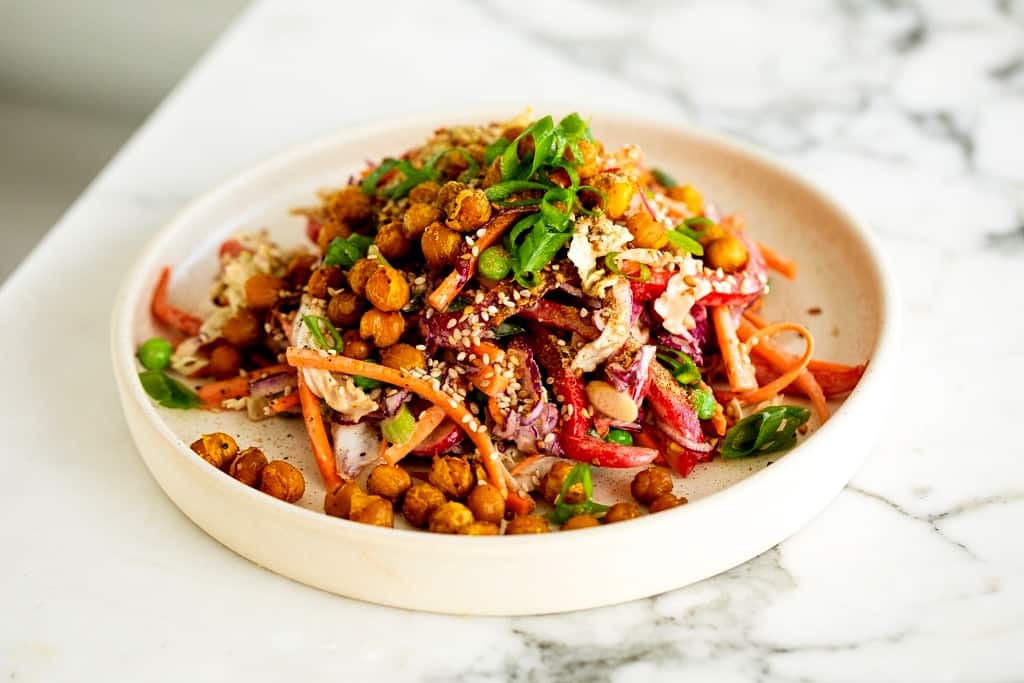
Something I often get asked about is if animal and plant-based protein provide the same thing- the answer is yes, but no.
While you absolutely can get enough protein in as a vegetarian or vegan, the main protein intake recommendation is to focus on variety in the diet. Even though plant-based protein does contain some of the same amino acids as meats, we would need to pair them with other plant-based protein sources to ensure you’re reaching all of the 9 essential amino acids.
This website does a great job of breaking down this information and I love referring to their chart on how to pair plant based proteins together to consume all of the essential amino acids.

My downloadable handout and this high protein vegan meal plan have tons of examples of plant-based proteins, so check those out.
Timing and Dosing of Protein
Not only do we need to think about the kinds of protein we eat, we also need to consider the amount at each meal for maximum muscle protein synthesis.
Instead of trying to consume all of your protein for the day in 1-2 meals, consider spacing it out throughout the day to ensure greater amino acid oxidation. One review found that one would need to consume 0.4 g/kg/meal across 4 meals in order to reach 1.6 g/kg/day of protein. However, to hit the upper daily limit, ~0.55 g/kg/meal would be needed.
In summary, space out your protein. Here is a great sample schedule of how you could meet these needs across 3 meals + 2 snacks throughout the day:
- Breakfast: 20 grams of protein
- Snack: 10 grams of protein
- Lunch: 35 grams of protein
- Snack: 15 grams of protein
- Dinner: 30 grams of protein
- Total = 110 grams of protein for the day

Bottom Line on Protein
Now that we’ve done a deep dive into protein, hopefully you have a better understanding of why and how to incorporate it into your daily diet. Lucky for you, I’ve provided a downloadable Protein 101 guide that summarizes all of these protein intake recommendations so you can keep on hand if you ever need a quick glance.
More Posts You Might Like
If you found this scientific insight into protein useful, read these next:
- What to Look For in a Protein Powder
- Protein for Weight Loss and Metabolism
- Best Postworkout Snacks and Swaps
- How Much Protein Do We Need?
Now, I’d love to hear from you: How do you incorporate protein in your meals and snacks? Have you noticed any health benefits? Share below!
Updated on March 14th, 2024

Abbey Sharp is a Registered Dietitian (RD), regulated by the Ontario College of Dietitians. She is a mom, YouTuber, Blogger, award winning cookbook author, media coach specializing in food and nutrition influencers, and a frequent contributor to national publications like Healthline and on national broadcast TV shows.
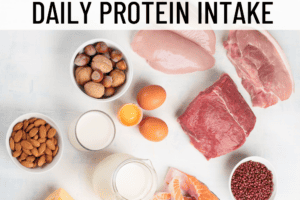


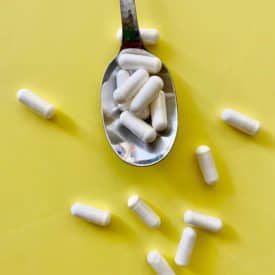

Amy says
Hi there, wondering how to access the pdf downloads?
Abbey Sharp says
Hi Amy, it should be sent to you after signing up through the button. I’ll have it emailed to you if you didn’t receive it.
Victoria says
Can I also get the download?
Diane says
How do I get the free downloads. I click on them but not downloading.
Thanks! I love your site!
Abbey Sharp says
Hi Diane! We’re working on getting the downloads ready but for now I’ll have it emailed to you 🙂 thanks for the love